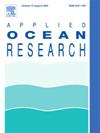Deep learning-based landslide tsunami run-up prediction from synthetic gage data
IF 4.3
2区 工程技术
Q1 ENGINEERING, OCEAN
引用次数: 0
Abstract
The present study proposes a deep learning model based on Long-Short Term Memory (LSTM) that uses gage measurements for prediction of landslide-driven maximum tsunami run-up. In an attempt to overcome the limitation of insufficient real-world data in the field, our methodology refers to analytical models to create a comprehensive dataset employing a time series recorded from an offshore gage as input and its corresponding maximum run-up at the shoreline as output, for different landslide scenarios with pre-determined parameters. The LSTM-based model is then trained using this dataset in order to predict the maximum run-up. The results, with mean values of 0.211 m, 0.149 m, 1.745% and 0.9988 for RMSE, MAE, MAPE and , respectively, indicate that our model is both accurate and precise. As the data-driven models such as the one proposed here are often utilized to identify relationships that may not be immediately apparent from the physical models alone, our interdisciplinary approach has the potential to foster the development of innovative solutions and methodologies for addressing complex natural hazards by enhancing early warning systems, preparedness and response to tsunamis.
求助全文
约1分钟内获得全文
求助全文
来源期刊

Applied Ocean Research
地学-工程:大洋
CiteScore
8.70
自引率
7.00%
发文量
316
审稿时长
59 days
期刊介绍:
The aim of Applied Ocean Research is to encourage the submission of papers that advance the state of knowledge in a range of topics relevant to ocean engineering.
 求助内容:
求助内容: 应助结果提醒方式:
应助结果提醒方式:


